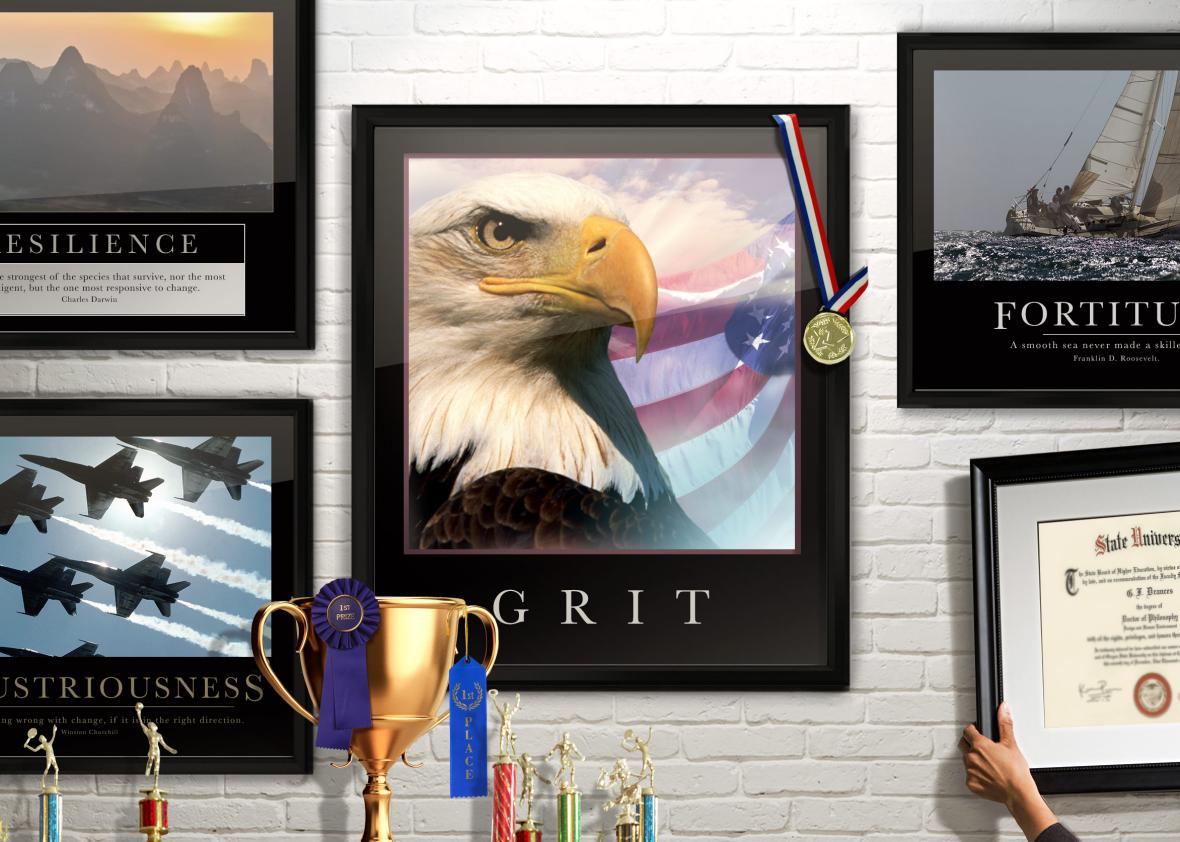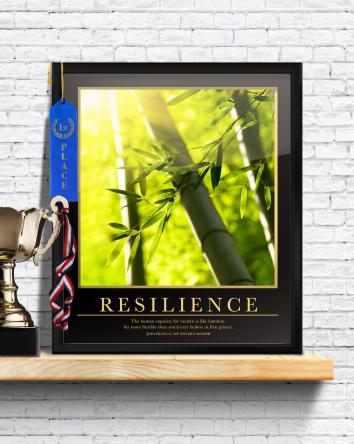Is “Grit” Really the Key to Success?
A new book says you need passion and perseverance to achieve your goals in work and life. Is this a bold new idea or an old one dressed up to be the latest self-help sensation?

Photo illustration by Natalie Matthews-Ramo. Photos by Thinkstock.
In the summer of 2004, Angela Duckworth, then a graduate student in psychology at the University of Pennsylvania, went up to West Point to study 1,200 new cadets. The first-years were about to start “Beast Barracks,” an infamous seven-week training program during which they’d toil in the classroom and on the field for 17 hours every day without a break. Many would drop out. Duckworth wanted to find out why some cadets managed to endure this challenge, while others just gave up.
Scientists have tried to solve this puzzle for more than 50 years, writes Duckworth in her new book Grit: The Power of Passion and Perseverance. But even the school’s best means of screening its applicants—something called the “whole candidate score,” a weighted mixture of a student’s SATs, high school ranking, leadership ability, and physical fitness—does not anticipate who will succeed and who will fail at Beast. So Duckworth designed her own way of scoring candidates, giving each a survey that tested his or her willingness to persevere in pursuit of long-term goals. She called this measure “grit.” And guess what? Grit worked. The cadets’ survey answers helped predict whether they would make it through the grueling program.
Duckworth’s best-seller peddles a pair of big ideas: that grit—comprising a person’s perseverance and passion—is among the most important predictors of success and that we all have the power to increase our inner grit. These two theses, she argues, apply not just to cadets but to kids in troubled elementary schools and undergrads at top-ranked universities and to scientists, artists, and entrepreneurs. Duckworth’s book describes a wide array of “paragons of grit,” people she’s either interviewed or studied from afar: puzzlemasters and magicians, actors and inventors, children and adults, Steve Young and Julia Child. Grit appears in all of them, sprinkled over their achievements like a magic Ajax powder. In tandem with some feisty scrubbing, it dissolves whatever obstacles might hold a person back.
While her book has only just arrived, Duckworth’s gritty tales—and the endlessly extensible ideas they represent—have already spread throughout the country, into classrooms, boardrooms, and locker rooms alike. Popularized in a viral TED talk from 2013 and validated by that year’s MacArthur “genius” grant, they’ve been inscribed into national education policy, and public school districts in California are grading kids—as well as schools themselves—on grit. Duckworth’s message has been broadcast with such speed and thoroughness that other people even started selling books on grit before she published her own.
With Grit, Duckworth has now put out the definitive handbook for her theory of success. It parades from one essential topic to another on a float of common sense, tossing out scientific insights as it goes along. How to raise your kids, how to unearth your inner passion, how to find a higher purpose—like other self-help authors, Duckworth finds authoritative answers to these questions, promising to change how we see the world. And like other self-help authors, she pulls a sleight of hand by which even widely held assumptions end up looking like discoveries. It’s as important to work hard, the book contends, as it is to be a natural talent. Who would disagree with that?

Zach Teris
Consider the recent run of best-selling pop-science books, often citing the same body of research, that purport to give us new, better, and more scientific ways to tweak our mindsets, get rid of our bad habits, and put in the 10,000 hours it takes to build a better life. Think of Malcolm Gladwell’s Outliers: The Story of Success, or his earlier piece for the New Yorker on “The Talent Myth.” Think of Carol Dweck’s Mindset: The New Psychology of Success, about the false belief that “talent alone creates success—without effort.” Think of Charles Duhigg’s The Power of Habit: Why We Do What We Do in Life and Business, about the neurology and psychology of changing behavioral patterns through hard and steady work. Think of Roy Baumeister and John Tierney’s Willpower: Rediscovering the Greatest Human Strength, about how a person’s self-control can be strengthened like a muscle.
These books convey the same optimistic message that you find in Grit: It’s possible for all of us to change or, as one book puts it, to feel the triumph of a “neuroplastic transformation.” They tell us that we needn’t be the victims of our meager talents or our lousy genes.
The fact that this message can be written and rewritten in so many different ways and still find a following hints that Americans are a gritty bunch already. Who’s more passionate and resilient—more a paragon of grit—than the earnest sap who spends 10,000 hours reading books that promise to change his life?
Still, good ideas will bear repeating. If Duckworth’s premises are valid—first, that grit matters more than talent; and second, that it’s possible to enhance your grit—then we ought to shout her message, and stream it, and push it even further up the best-seller list. If grit really works as both a diagnostic tool and a target for intervention, then it could help the elite and underprivileged alike. It could elevate the strivers to even greater heights, while pulling up the ones who are too often left behind.
But a closer look at Duckworth’s seminal research, as well as some recent studies from her colleagues in the field, suggest there isn’t much supporting evidence for either of her theses. It now appears that someone’s grit, as compared with other, more familiar measures of her character, may not matter in determining success. And there’s good reason to believe that intervening to enhance a person’s passion and perseverance—“growing grit,” as Duckworth calls it—would be highly inefficient.
You can expect to hear Duckworth’s message many times in the weeks and months ahead, as it comes to dominate the culture of self-help: “Grit is good.” This maxim hides shortcomings in the work, however, and it overlooks a crucial fact: The single-minded pursuit of single-mindedness may carry dangers of its own.
* * *

Photo illustration by Natalie Matthews-Ramo. Photos by Thinkstock.
Up in the Hudson Valley, among the plebes at Beast Barracks, Duckworth found the secret of success. Students who identified with statements such as “Setbacks don’t discourage me” and “I never give up” were more likely than their peers to make it through West Point’s seven-week test of fortitude. (That’s how grit is measured: Students assign themselves a score of 1 to 5 for each of 10 related character statements; the 10 scores are then averaged together.) This was Duckworth’s first case study, and it delivered a clear and forceful message: If you want to make it through basic training, you gotta have grit.
Here’s another less surprising way to frame the same research: Grit matters, but only in specific situations that require strength of will.
To make it through Beast, cadets must perform extraordinary feats of mental and physical stamina. They do pushups, situps, pullups, dips, flutter kicks, and arm claps; they have to run for miles every day; they’re forced to hustle even as they move from one class to another. Is it any wonder that someone’s whole candidate score, the measure that includes his SAT scores and his high-school grades, would have little bearing on his success or failure?
Duckworth likes to talk about “the marathon of life,” as if we’re all going through our own private versions of the training at West Point. But for most people, life may be less like a marathon than a series of sprints, interspersed with periods of rest, conversations with our friends, and hours upon hours spent browsing the internet.
Even the task of graduating from West Point itself doesn’t really compare to the trials of Beast. When Duckworth looked at students’ grades and “military performance scores” during their first year at school, she found that grit offered little guidance on how they’d handle the rest of the United States Military Academy curriculum. The whole candidate score—that old-fashioned, talent-based assessment—did much better. Considering that three-quarters of the students who fail to finish at West Point flunk during the post-Beast curriculum, those first seven gritty weeks appear to represent a special case, and one of marginal importance.
To show that the challenges of Beast stand in for those of life, Duckworth looked for grit in other settings, places where one might not expect to find endurance as a major factor in success. For one study, she surveyed 149 undergrads at the University of Pennsylvania, finding that the students’ grit and SAT scores—the latter used as a proxy for their natural aptitude—were each and independently related to their school performance as measured by their grades. Even for these brainy Ivy Leaguers, grit seemed to be just as important as intelligence. Indeed, Duckworth writes that this was one of the key findings that led her to the “fundamental insight that would guide [her] future work.”
There’s a hitch in this analysis, though, one academics refer to as a “restriction of range.” Duckworth was looking at a tiny sliver of the distribution of intelligence: Students in the Penn study group had an average SAT score of 1,415, putting them in the 96th percentile nationwide. Since everyone in her study was superbright, even the very brightest weren’t that much brighter than the rest of the group. That sort of bunching-up tends to make even robust correlations go away. To wit: We can all agree that, as a rule, being really tall correlates with scoring points while playing basketball. But if you look only at the players in the NBA, where the players’ average height is 6-foot-7, that effect disappears—in the NBA, the tallest players aren’t necessarily the highest scorers.
When everyone excels on one dimension—height, SAT scores—other factors will appear to play an outsize role. In the case of Duckworth’s brainy Ivy Leaguers, this makes their SATs seem less important for predicting how they’ll do in school and exaggerates the relative importance of their grit. If she’d mixed the same people in with a more balanced sample of their peers, let’s say those with average SAT scores closer to 1,000, then the link between their aptitude and grades would have appeared more pronounced—and that would in turn have made the correlation with their grit seem less impressive.
In her paper on this research, Duckworth notes that the same issue might also work in the opposite direction: If the Ivy Leaguers were somewhat grittier than other kids, then the signs of their hard work would also be reduced in the analysis. Still, you’d expect this distortion to be more pronounced for the students’ SATs, since we know they were selected for admission to the university precisely on the basis of those scores.
This isn’t just an issue with one of Duckworth’s studies. Another, in which she measured the grit of contestants in the National Spelling Bee, has similar range-restriction issues. (Her paper on the Ivy League and the National Spelling Bee research does acknowledge this concern, noting that it may “attenuate” the link between IQ and achievement.) But despite this shaky base of evidence, Grit doesn’t merely claim that perseverance makes a difference. The book argues that it makes all the difference in the world.
* * *

Photo illustration by Natalie Matthews-Ramo. Photos by Thinkstock.
Among Duckworth’s major virtues as an author is her commitment to transparency. She never claims that she’s identified a trait that no one has ever seen before, nor does she ignore all the other scientific measures of a person’s character that overlap with the one that she invented. A person’s grit, she would acknowledge, must not be so far off from what some might call her willpower, or others her resilience, or else perhaps her industriousness, impulse control, or fortitude. Duckworth also likens grit to other trendy latecomers to psychology: growth mindset and capacity for flow. In looking to the past, she mentions grit’s relationship to sisu, a Finnish virtue that sustained the soldiers of the Winter War in 1939. She might have gone back much further still, to the factor known as w, meant to represent a person’s “consistency of actions resulting from deliberate volition,” which debuted in psychology in 1915.
In the book and elsewhere, Duckworth shows a noble willingness to piggyback her work on that of other researchers, explaining how they reach a common end. But that doesn’t make this array of intersecting concepts any less bewildering. We’re still left to wonder where, exactly, one might locate grit amid the rows and seedbeds of psychology. Does it represent a novel species, like the orchids and the dandelions (first described as mental types in 2008), or is it just a modern cultivar of something planted long ago?
That’s long been a problem for personality psychologists, who often struggle with competing terms for common, underlying inclinations. The field had become a tangled mess by the 1950s and the 1960s, says Brent Roberts, a professor at the University of Illinois (whom Duckworth also cites). For any given outcome in a person’s life—whether he might turn out to be a drunk, let’s say, or a genius or a crook—researchers would devise a brand-new measure, calibrated to predict it. “It had a brutal elegance,” Roberts says, “and I often pine for those days, to be honest with you.”
But this rampant sowing of new ideas made it hard even for the specialists to find their way within the field. They didn’t always know how their measures related to their colleagues’ or if they might be duplicating one another’s work. By the 1980s and the 1990s, lumpers in psychology had embraced a grand unified theory of personality, which collapsed all the nuances that came before into a set of supertraits—the Big Five. Under this new system, grit and all its near and distant cousins—willpower, superego strength, industriousness, and so on—would fall under an umbrella factor known as “conscientiousness.” (The remaining four of the Big Five supertraits: extraversion, agreeableness, neuroticism, and openness to experience.) Like grit, conscientiousness could be measured with a survey: a set of statements, maybe several hundred, for a person to read and then assign himself a score. (There are other ways to measure personality: A psychologist might ask people, for example, whether they engage in specific behaviors such as making lists or showing up early for meetings.)
“[The Big Five] brought clarity to a true buzz of confusion,” Roberts says, and it allowed researchers to make bigger claims about the broad significance of character. A measure of someone’s conscientiousness, for example, could help predict her longevity and physical health, as well as her marital stability. It could also tell you how likely she would be to find success in high school, college, and the workplace. But if the adoption of the Big Five proved useful in the lab, it made the science of personality harder to explain to outsiders. “When I say, conscientiousness,” says Roberts, “people go, ‘Huh?’ ”
That’s why Duckworth worked so hard to give her measure a catchy name. “I came up with it over other terms like pluck, tenacity, persistence, perseverance,” she said during one interview. “It has the connotations that I wanted. It sounds good.” It’s true: Conscientiousness comes off as something weak—a nerdy way of playing by the rules; grit suggests a vigorous, old-fashioned form of virtue. Grit’s the antidote for an overpolished age, a return to rough-hewn authenticity. “It’s brilliant in terms of marketing,” says Roberts. “People understand it immediately.”
Grit the measure and Grit the book are clearly triumphs of rebranding. It’s not as easy to discern whether Duckworth has produced something more than that—a set of new and substantive ideas to match her innovative presentation. To put this another way: Is she the Alice Waters of psychology, the leader of a revolution, or is she the field’s Rick Mast, more a pioneer of pretty packaging?
A brand-new meta-analysis of the literature on grit—conducted by researchers Marcus Credé, Michael Tynan, and Peter Harms using 88 samples and 67,000 subjects—provides some clues.* There isn’t much space between Duckworth’s measure and conscientiousness, the study argues. If you test a group of people for both traits, administering standard surveys to measure grit and conscientiousness, the results will end up very tightly linked; in some studies their relationship approaches 1-to-1. In Roberts’ view, grit corresponds very closely to a facet, or subtrait, of conscientiousness that has for many years been called industriousness.
Duckworth acknowledges the similarities between grit and conscientiousness and says that both predict achievement. (Again, she’s very forthright about the limitations of her work.) But she also argues that grit adds value to the other measures—that it’s a better way of measuring success. The majority of recent research, though, conducted on students of different ages and in different countries says that argument is wrong.
For one paper, from 2014, a pair of Yale psychologists looked at several hundred teenagers at a private high school in New England and checked scholastic outcomes (disciplinary record, grades, academic honors, etc.) against their measured grit, conscientiousness, and something called “emotion regulation ability.” Only the latter two had predictive value; grit proved to be extraneous. The authors proposed that school success might demand more than simple, gritty passion and persistence. To excel across the board, teens must have the social skills to forge relationships with both their teachers and their peers, and their focus must be balanced across many different kinds of challenges.
Two more studies came out just this year. In one, Austrian researchers followed nearly 500 eighth-grade students and managed to explain about 40 percent of the differences among the students’ grades on the basis of their relative intelligence and conscientiousness. Kids who measured higher in grit did do somewhat better in their classes, overall, but not in any unexpected way: Their conscientiousness appeared to be the overriding factor, with grit as one component. The second study looked at 156 college freshmen taking physics at a community college in Montreal and found that grit had little value at predicting their success.
The fact that grit fails to offer extra information in these settings—that it may be little more than a new and glossy version of an old idea—does not make it unimportant. Roberts, for one, is thrilled to have Duckworth on his side, arguing for the importance of character in fostering success. A 2009 meta-analysis of personality and academic performance found that, across 80 different studies, a student’s conscientiousness can predict her academic outcomes, to an extent that’s comparable to her intelligence and socio-economic background. Duckworth’s evangelism for grit—as opposed to self-control, willpower, conscientiousness, and the rest—may be parochial, but at least it helps to drive this bigger message home.
But that’s only half of Duckworth’s argument. It’s one thing to argue that grit matters more than talent or—more accurately—that your personality helps determine your success. Duckworth goes much further, asserting that you can change your personality and learn to “grow your grit.”
* * *

Photo illustration by Natalie Matthews-Ramo. Photos by Thinkstock.
It takes Duckworth 80 pages to argue for the power of grit. It takes 200 more for her to explain that we can all be grittier. These latter sections serve what she calls her “purposeful, top-level goal” in life, the passion to which she applies her own reserve of grit: She wants to “use psychological science to help kids achieve and thrive.” She hopes to prove to us that change is possible, and then she wants to tell us how to make it happen.
Grit aims to offer scientific tips on how to choose your own purposeful, top-level goal and how best to practice at it. It tells readers they should find a greater meaning in that goal and keep their spirits up when things start to go astray. The book gives advice on how to foster grit at home, at school, and in the workplace. But in the end, these rules of thumb—practice optimistic self-talk, find a mentor, go to therapy—have less to do with the study of psychology than with common sense and intuition. That’s not Duckworth’s fault: The problem is that there haven’t been so many studies on “growing grit.”
Always modest even as she makes her sweeping claims, Duckworth notes this lack of solid research. That doesn’t stop her from dispensing helpful aphorisms, though. In the section on how to change your child’s grit through parenting, Duckworth tells readers that she’d love to wait for scientific evidence, “but as a mother of two teenagers, I don’t have time for all the data to come in. Like the parents asking me this question, I have to make decisions today.”
In lieu of data, she provides a string of anecdotes—celebrity interviews, mostly—interspersed with authoritative equivocations. It’s important for a child to overcome adversity, she concludes, but not too much adversity, which can damage him for life. Parents should be very demanding but also very warm and loving. Children should devote themselves to their activities but not be so single-minded that they fail to find their passions.
This doesn’t sound like bad advice, but I’m not sure how well it serves Duckworth’s top-level goal. While her book assumes we can choose to change our grit, the research that we do have seems to gesture at the opposite. Two recent twin studies (one of which is not yet published) looked at how grit and other personality traits predict academic success and how they relate to genetics. Like many other studies, they find that grit has little predictive value of its own (as compared with conscientiousness or other personality factors). But the analyses of twins reveal something else: While differences in grit can be explained in part by the students’ genes, they cannot be explained by shared environmental factors. In other words, there’s no evidence that the differences in how we’re treating kids today—the standard range of parental styles and pedagogic modes—are doing much at all to grow (or shrink) their grit.
It may even be the case that a child’s personality is no more (or less) amenable to change than his basic cognitive skills. That is to say, we might do just as well (or poorly) at helping kids to thrive if we tried to help them grow their genius, not their grit.
Even better, we could focus on more specific skills that have a clear relationship to student grades. Why not try to foster better study habits in our kids or teach them tricks for improving their attendance? Those aren’t big book tour–ready concepts, but they’ve been shown to have effects. If Duckworth’s book can tell us anything at all, it’s that we shouldn’t lose our focus every time we come across a new idea in shiny packaging. It might be better if we persevered and stuck to things that work.
The self-help industry has little time for such considerations, though. The church of grit has grown so rapidly in the past few years, and with such incautious fervor, that even Duckworth has been calling for a pause.
In a March op-ed for the New York Times, she decried recent efforts to measure grit in public schools and to evaluate teachers on their success at making kids more gritty. “We’re nowhere near ready—and perhaps never will be—to use feedback on character as a metric for judging the effectiveness of teachers and schools,” Duckworth wrote. Still, the same essay cites her study showing that kids can be taught the gritty skills of setting goals and making plans and that this learning helps them to succeed. That research isn’t quite a proof of principle: It looked at 77 fifth-graders at an urban public school and checked to see if the skills training would improve the students’ report cards, classroom attendance, and conduct. The intervention seemed to work—but only for a single academic quarter. By the end of the year, the effects had gone away.
In the concluding section of her book, Duckworth arrives at her final big idea—what she calls “the culture of grit.” Here she finds her paragon in Pete Carroll, Super Bowl–winning head coach of the Seattle Seahawks and author of a memoir called Win Forever. In 2013, she says, Carroll watched her TED talk and decided he had to get her on the phone. He wanted to know more about Duckworth’s research, and he wanted to tell her that “building grit is exactly what the Seahawks culture is all about.” Two years later, she went to the team’s training facility and gave lectures on the power of grit to Seahawks players, coaches, and scouts. The visit was for research, too: Duckworth says she learned how the Seahawks remain courageous, and find lessons, even in the heartbreak of defeat. “Compete in everything you do,” they say. “You’re a Seahawk 24-7. Finish strong. Positive self-talk. Team first.”
This Seahawks visit forms the book’s anchoring anecdote and its final case study of success. But for me it raised a ticklish question: There may be power in having passion and perseverance, but might there be some menace, too? Could it be that football shows the darker side of grit and the ways that it goes wrong? The NFL sells itself on manly virtues: fighting through adversity, getting knocked down and getting up again, leading with the head, playing through your injuries, giving up your body for the game. That sounds a lot like grit—but is it good?
For win-forever guys like Pete Carroll, the benefits of grit seem to have no bounds. (“The best way to advance something is to live it out in everything you do,” he says.) Even in a league that doesn’t lack for excess in this regard, Carroll’s team has often pushed the line: In 2013, he got called out for a pattern of his players taking performance-enhancing drugs;* in 2014, he was fined for having players hit one another at a practice, in violation of league safety rules; in 2015, he was criticized for fielding players with a history of domestic violence. Depending on your point of view, the Seahawks could be taken as a cautionary tale, of what happens when you pray with too much zeal at the altars of passion and perseverance.
It could be that having too much strength of purpose is worse than having not enough. At least that’s what I’d like to think: I took Duckworth’s test last week and learned to my dismay that I’m among the nation’s least gritty citizens. The trait is scored from 1 to 5, and I came in at 2.9. That sounds like it could be right around the average, but in fact it’s very low. According to Duckworth’s book, my grittiness puts me in the 20th percentile of American adults—more mercurial and weak-willed, less inclined to follow through, than four-fifths of the U.S. population.
That’s OK with me. As a journalist, I thrive on flexibility, flitting around from one topic to another; I don’t believe my job lends itself to grit. Mine is not the only field where inconstancy can be a virtue. If you want to win forever on the football field, or join the military, or write a book about a big idea, then it might be best to stay on target, compete in everything, and finish strong. But others find their path through mindful wavering and steer away from simple answers.
Update, May 9, 2016: This piece has been updated to include the names of the researchers who conducted a meta-analysis of the literature on grit. (Return.)
Correction, May 24, 2016: This article originally misstated that Seattle Seahawks coach Pete Carroll got called out for a pattern of his players taking steroids. It was a pattern of players taking performance-enhancing drugs. (Return.)
